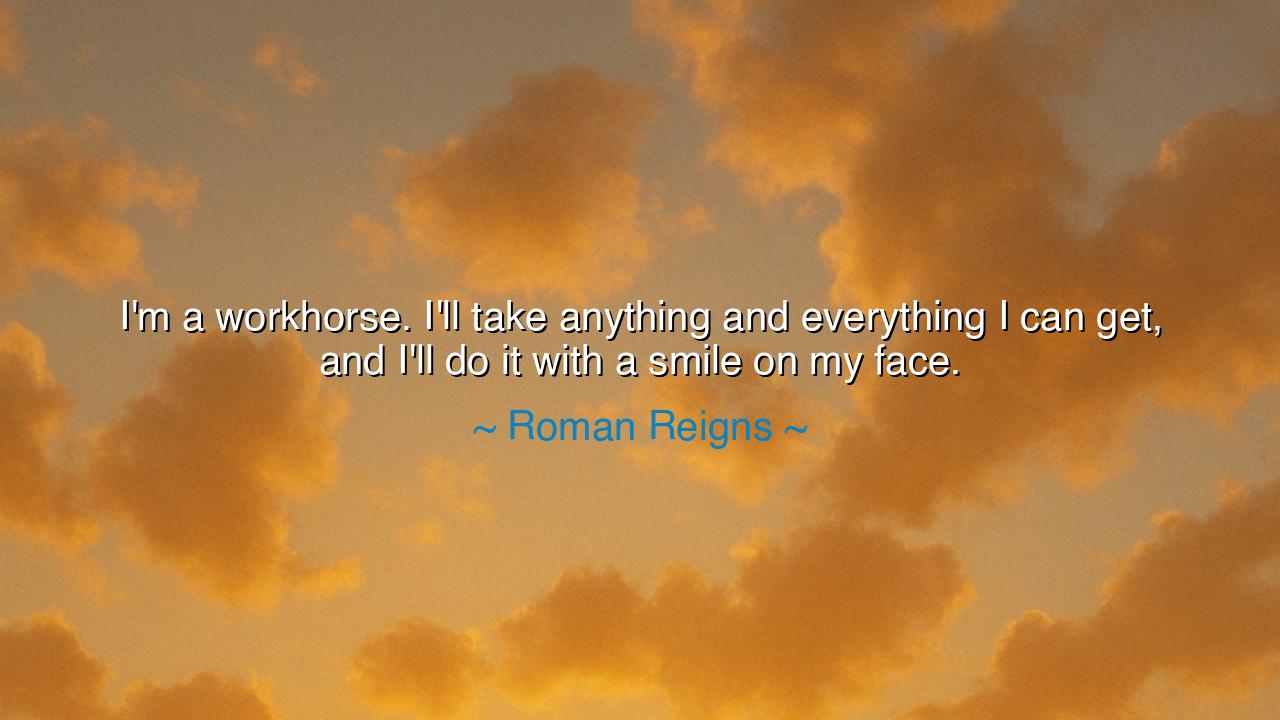
I'm a workhorse. I'll take anything and everything I can get, and
I'm a workhorse. I'll take anything and everything I can get, and I'll do it with a smile on my face.






Hear, O seeker of strength, the words of Roman Reigns, the warrior of the ring, who declared: “I’m a workhorse. I’ll take anything and everything I can get, and I’ll do it with a smile on my face.” These words are not the idle boast of a man puffed up with pride, but the creed of one who knows the weight of labor, the grind of discipline, and the nobility of bearing burdens without complaint. In his saying lies the spirit of the ancients, who honored not only kings and generals, but also those who toiled endlessly with courage and dignity.
For what is a workhorse? It is the beast of endurance, the servant of fields and plow, that labors tirelessly from dawn to dusk, not for glory, but for necessity. To claim such a name is to embrace humility as well as strength. Roman does not call himself a stallion, adorned for parades, nor a hawk, soaring above men, but a creature of persistence, of duty, of ceaseless effort. This alone is wisdom: to recognize that greatness is not only in shining moments of victory, but in the countless unseen labors that build the foundation of triumph.
And yet, he adds: “I’ll do it with a smile on my face.” Here is where his teaching deepens. For many can endure toil, but they do so grudgingly, with bitterness in their hearts and heaviness in their steps. But to endure and to keep a smile, to carry joy even into hardship—this is a higher strength. The ancients knew this truth: that the laborer who sings at the plow carries twice the spirit of the one who curses his lot. Joy in work is not weakness; it is mastery of the self, the triumph of spirit over circumstance.
Consider the tale of Nelson Mandela, imprisoned for twenty-seven years, forced into hard labor and deprived of freedom. Yet those who encountered him within the prison walls often spoke of his calm dignity, even his quiet smile, which unnerved his captors and uplifted his fellow prisoners. Though oppressed, he became like the workhorse Roman describes—bearing immense burdens but refusing to let them crush his spirit. When at last he emerged, it was this resilience, not bitterness, that enabled him to lead his nation toward reconciliation.
The lesson is clear: life will heap upon you “anything and everything”—tasks, trials, burdens beyond measure. You may not choose the weight, but you may choose the spirit with which you carry it. To complain is to waste strength. To despair is to surrender before the battle is done. But to work tirelessly, and to carry a smile even in the storm, is to declare mastery not only over the world, but over yourself.
This teaching calls us to courage. Not all are called to be champions in arenas, but all are called to labor: in fields, in homes, in work that may feel endless. If you would be remembered, then be as the workhorse—steady, enduring, reliable. And let your face not be twisted with complaint, but brightened with the quiet joy that comes from knowing you are stronger than your trials.
Therefore, O traveler, adopt this creed: do your work fully, take on what life places before you, and meet it with courage and dignity. Train your spirit to smile even under burden, for in that smile lies victory greater than applause—it is the victory of the soul that will not break. This is the secret of champions, the hidden strength of leaders, the enduring wisdom of those who labor with joy.
Thus Roman Reigns’ words, though born in the theater of sport, resound as a teaching for all ages: be tireless, be steadfast, and above all, let your smile proclaim to the world that no weight can bend the spirit of one who endures with grace.






AAdministratorAdministrator
Welcome, honored guests. Please leave a comment, we will respond soon